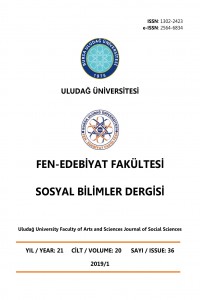Öz
ve “erek” kavramlarını irdeleyeceğim. Kant ahlak teorisini koşulsuz kategorik
imperatif ilkesine dayandırmasına rağmen, erek ve özerklik ideleri aracılığıyla
erekselci bir özgürlük felsefesi geliştirir ve böylece “moralitenin en yüksek
ilkesinin” kendi koyduğu yasalara tabi olan “kişilik” olduğunu göstermeye
çalışır. Ahlak yasasının zemininin doğrudan özgürlük olduğu da göz önüne
alınırsa, kişiliğin özerkliği daha büyük bir anlam kazanır. Ancak Kant böyle
bir teoriden doğan içerimleri de dikkate alır. Ona göre kendilerinde erekler
olan kişiliklerin iyiliği hayata geçirmek amacıyla moral ilişkiler kurduğu bir
toplumu yaratarak ancak, insanlar bir yetkinliğe erişebilirler. Öte yandan bu
iki kavramı çözümlerken Kant'ın etik felsefesine yöneltilen bazı suçlamalara da
yanıt vermeye çalışacağım.
Anahtar Kelimeler
Kaynakça
- Aristoteles (1957). Ethica Nicomachea. London: Oxford.
- Bauch, Bruno (1911). Geschichte der Philosophie, Immanuel Kant. Leipzig: Göschen’sche Verlagshandlung.
- Hartmann, Nicolai (1954). Einführung in die Philosophie Nachschrift. Teksir Tarihsiz.
- Hegel, Georg Wilhelm Friedrich (1971). Grundlinien der Philosophie des Rechts. Frankfurt: Suhrkamp.
- Kant, Immanuel (1911). Kant’s gesammelte Schriften, Erste Abtheilung, Kant’s Werke (Band IV). Berlin: Verlag von Georg Reimer.
- Kant, Immanuel (1913). Kant’s gesammelte Schriften, Erste Abtheilung, Kant’s Werke (Band V). Berlin: Verlag von Georg Reimer.
- Kant, Immanuel (1914). Kant’s gesammelte Schriften, Erste Abtheilung, Kant’s Werke (Band VI). Berlin: Verlag von Georg Reimer.
- Kant, Immanuel (1942). Kant’s gesammelte Schriften, Nachlass (Band XX). Berlin: Verlag von Georg Reimer.
- Kuçuradi, İonanna (1997). Uludağ Konuşmaları. Ankara: Türkiye Felsefe Kurumu
- Scheler, Max (1954). Der Formalismus in der Ethik und die materiale Wertethik. Bern: Francke Verlag.
- Schiller, Friedrich (1962). Sämtliche Werke Band I. München: Hanser.
Öz
In
this paper I will try to give an insight into the main concepts of “autonomy”
and “end” in Kantian ethics. In spite of the fact that Kant based his moral
theory on the unconditional principle of categorical imperative, he brings
together the moral components of autonomy and end to formulate a teleological
philosophy of freedom in order to show that “the supreme principle of morality”
is a personality who is subject only to laws given by himself. When taken into
account the assumption that the ground of moral law is freedom, the autonomy of
personality gains more signification. But Kant also considers the implications
that arises with such a theory. Kant thinks that human beings can only attain
perfection by creating a society where personalities as ends in themselves form
moral relations with a view that goodness should come into existence. I will
also elucidate these two important concepts so that I may respond to the
several charges leveled against Kant’s ethical philosophy
Anahtar Kelimeler
Kaynakça
- Aristoteles (1957). Ethica Nicomachea. London: Oxford.
- Bauch, Bruno (1911). Geschichte der Philosophie, Immanuel Kant. Leipzig: Göschen’sche Verlagshandlung.
- Hartmann, Nicolai (1954). Einführung in die Philosophie Nachschrift. Teksir Tarihsiz.
- Hegel, Georg Wilhelm Friedrich (1971). Grundlinien der Philosophie des Rechts. Frankfurt: Suhrkamp.
- Kant, Immanuel (1911). Kant’s gesammelte Schriften, Erste Abtheilung, Kant’s Werke (Band IV). Berlin: Verlag von Georg Reimer.
- Kant, Immanuel (1913). Kant’s gesammelte Schriften, Erste Abtheilung, Kant’s Werke (Band V). Berlin: Verlag von Georg Reimer.
- Kant, Immanuel (1914). Kant’s gesammelte Schriften, Erste Abtheilung, Kant’s Werke (Band VI). Berlin: Verlag von Georg Reimer.
- Kant, Immanuel (1942). Kant’s gesammelte Schriften, Nachlass (Band XX). Berlin: Verlag von Georg Reimer.
- Kuçuradi, İonanna (1997). Uludağ Konuşmaları. Ankara: Türkiye Felsefe Kurumu
- Scheler, Max (1954). Der Formalismus in der Ethik und die materiale Wertethik. Bern: Francke Verlag.
- Schiller, Friedrich (1962). Sämtliche Werke Band I. München: Hanser.
Ayrıntılar
| Birincil Dil | Türkçe |
|---|---|
| Konular | Felsefe |
| Bölüm | Makaleler |
| Yazarlar | |
| Yayımlanma Tarihi | 31 Ocak 2019 |
| Yayımlandığı Sayı | Yıl 2019 Cilt: 20 Sayı: 36 |

This work is licensed under a Creative Commons Attribution 4.0 International License.


